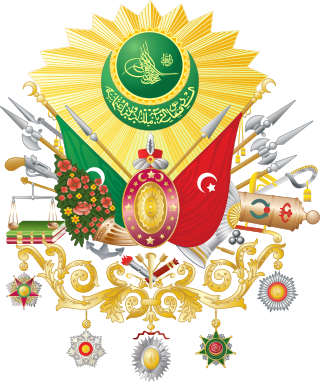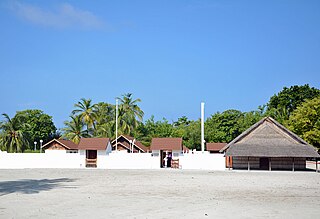Related Research Articles

The Ottoman dynasty consisted of the members of the imperial House of Osman, also known as the Ottomans. According to Ottoman tradition, the family originated from the Kayı tribe branch of the Oghuz Turks, under Osman I in northwestern Anatolia in the district of Bilecik, Söğüt. The Ottoman dynasty, named after Osman I, ruled the Ottoman Empire from c. 1299 to 1922.
Osman is the Persian and Turkish transliteration and derived from the Arabic masculine given name Uthman or an English surname. It may refer to:

Utheemu is one of the inhabited islands of Haa Alif Atoll administrative division and geographically part of Thiladhummathi Atoll in the north of the Maldives. It is an island-level administrative constituency governed by the Utheemu Island Council.
The laari is a coin denomination issued by the Maldives as the subdenomination of the Maldivian rufiyaa since 1960. One rufiyaa is equal to 100 laari. It was issued in denominations of 1, 2, 5, 10, 25 and 50.

The Utheemu dynasty was created in 1573 when Muhammad Thakurufaanu Al Auzam became sultan of the Maldives. The dynasty was named after the northern Maldives island of Utheemu, birthplace of Muhammad Thakurufaan. Muhammad Thakurufaan is considered a national hero, as he and his two brothers led a successful rebellion against the Portuguese and established his country's independence. Thirteen more sultans ruled during this dynastic period, which ended in 1697.
The Judiciary in the Maldives has been a systematic institution throughout the history of the nation. It has always been an institution which is under the full control of the Head of State and is still to some degree. However a radical change occurred during the past decades, the introduction of the English legal system into the country; a result of the Maldivian society coming in close contact with the outside world. Consequently, the present legal system of the country is a mixture of not only Shari’ah and customs, but the English legal system also.

François Pyrard de Laval was a French navigator who is remembered for a personal written account of his adventures in the Maldives Islands from 1602 to 1607, which was part of a ten-year sojourn (1601–1611) in South Asia, et al. He was a native of Laval, and was a cousin to theologian Pierre Pyrard (1581–1667).
Şehzade Ali Vâsib Efendi was an Ottoman prince. From 1977 to his death in 1983, he was the 41st head of the Imperial House of Osman, the Ottoman royal dynasty.
Osman I of Fehendhoo was the Sultan of the Maldives in 1388. He ruled the country for 6 months and 15 days. Sultan Osman was also the last sultan to ascend the throne of the Maldives from the Lunar Dynasty, ending the 227 years of Lunar Dynasty rule since the Maldives converted to Islam from Buddhism.
Sultan Hassan Al-Hilaaly I, Sri Veera Bovana Mahaa Radhun was the first sultan to ascend the throne of Maldives from the Hilaalee dynasty by abolishing the dynasty which had ruled the Maldives for more than two centuries. He ascended the throne of The Maldives in 1388 and ruled for 10 years.
Sultan Ibraahim, Sri dhanmaru Veeru Mahaa radhun was Sultan of the Maldives briefly in 1398 and again from 1412 to 1420. He was the eldest son of Sultan Hassan I of the Maldives. He ruled the country for four months in 1398 before abdicating in favour of his uncle Hussain.
Sultan Danna Mohanmed Sri Raadha Bavana Mahaa Radun was the Sultan of Maldives in 1421. He was the son of Prince Yoosuf Abbas Hadheygirin, and a member of the Hilaalee dynasty. This Sultan ruled the country for only 11 months until he was forced to abdicate by Prince Yoosuf.
Sultan Haji Hassan III Sri Dhaadha Veeru Mahaa Radhun was the sultan of Maldives from 1443 to 1467. He ascended the throne after the death of his father, Sultan Abookuru I. In his 25th year of reign he chose to pay a visit to Mecca for Hajj and he made his young son as the regent while he was away. While he was in Mecca he was deposed by Sayyidh Muhammad.
Sultan Muhammad II Sri Bavana Mahaa Radhun was the Sultan of Maldives from c. 1467 – c. 1481, succeeding his father Sultan Hassan III to the throne. He was known as a cruel Sultan who ruled like his father.
Sultan Ibrahim Iskandhar Siri kularanmeeba Kathiri Bavana Mahaa Radun was the sultan of Maldives from 1648 to 1687. He was the son of HH Sultan Muhammad Imaduddin I and Kabaa Aisha. Iskandar ascended to the throne of Maldives at age 18, after the death of his father. During his reign, he rebuilt the Malé Hukuru Miskiy in Malé and began educating his people by teaching the Qur'an. Iskandar died in 1687 after ruling nearly for 40 years. He was succeeded by his son Kuda Muhammad under the regency of his consort Mariyam Kaba'afa'anu Rani Kilege.
Abd al-Aziz Maqdshāvi was a 14th-century island chief or katheeb of Kinolhas island of Maldives during the reign of Queen Sultana Khadija.
Kara Davud Pasha, also known as simply Davud Pasha or as Hain Davud Pasha, was an Ottoman statesman who became briefly Grand Vizier of the Ottoman Empire in 1622, during the reign of his brother-in-law Mustafa I.
The caste system in the Maldives is the social stratification system found among the ethnic groups of the islands.
References
- ↑ Taj al-Din, Hasan. The Maldivian chronicle Ta'rikh. Tokyo University of Foreign Studies. pp. 189. Archived from the original on 28 June 2020.
- 1 2 Pyrard, François; Bergeron, Pierre de; Bignon, Jérôme (1887). The voyage of François Pyrard of Laval, to the East Indies, the Maldives, the Moluccas and Brazil. Vol. 3. London: Hakluyt Society. p. 531.